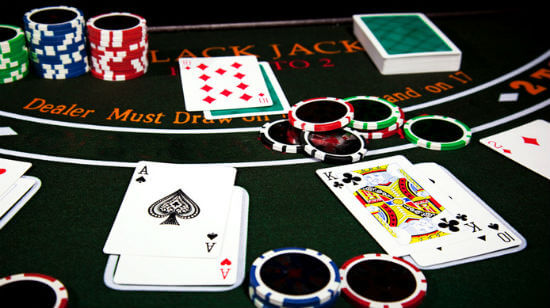A card game in which you play against the banker, has multiple variants. Based on the variant you play, your blackjack odds of winning will change. Most blackjack games give the house an advantage of about 8%. The reason the house gets the edge is because the dealer is the last to act. As the player acts first, there is a strong possibility that the decision he makes will be one that causes him to bust. Once the player busts, he will lose his bet, irrespective of whether the dealer busts later or not.
Chances of Player Busting for Each Hand value
To avoid this to an extent, the player should know the probability of his hand busting based on the total it makes. Here are the percentages of chances your hand will go bust for each value:
- 100% for 21
- 92% for 20
- 85% for 19
- 77% for 18
- 69% for 17
- 62 % for 16
- 58% for 15
- 56% for 14
- 39% for 13
- 31% for 12
- 0% for 11 and below
Probabilities for Dealer’s Final Hand
Here are probabilities that the dealer will have a certain hand total by the end of a round:
- 16 – 28.36%
- 17 – 14.58%
- 18 – 13.81%
- 19 – 13.48%
- 20 – 17.58%
- 21 with a minimum of three cards – 7.36%
- Natural blackjack - 4.82%
Player Advantage Based on Dealer Up Card
You can increase your chances of winning based on the probability that the banker will bust if he has a certain upcard. As the player, you get a bigger advantage for a certain card combination the dealer holds, when compared to others. For instance, if the dealer has a 5 or 4 as the upcard, you have the highest advantage in the game, at 23.9% and 23.2% respectively.
In case the dealer’s upcard shows 3, 2, 8 and 7, the advantage is lower, at 13.4%, 9.8%, 5.4% and 14.3%. You should ideally not place additional bets or continue with a hand that has 9, A, J, K or Q. This is because the hands come with a negative advantage.
Rule Variations and Impact on House Edge
Rule variations have an impact on the house edge, which will in turn affect your chances of winning. Here are some of the rules:
- If you play a game in which the dealer stands when dealt a soft 17, you will be able to decrease the house edge by approximately 0.2%.
- In two games where all factors are the same, except the number of decks, the one with fewer decks will be in favor of the player. There is a higher chance the player will be able to draw a blackjack with an ace later in the game, if he gets a ten first.
- In case you get to hit hands made after splitting aces, you will be able to reduce house advantage by approximately 0.13%.
- Games that allow players to double down on two cards following the splitting of hands are in favor of the player. However, if you play in a game that does not allow this, the house will have an additional edge of 0.12%.
A player can reduce the house edge from 8% to 0.5% by using basic strategy.





















